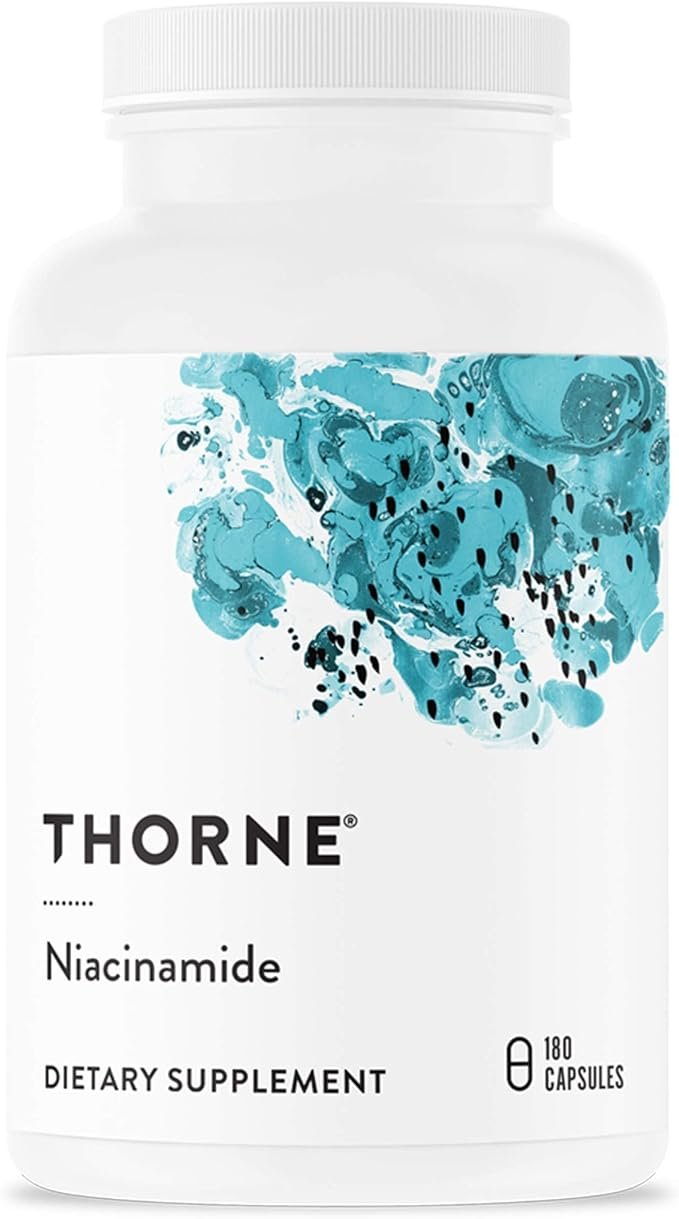Vitamin B3 supplements, commonly known as niacin, are a water-soluble vitamin that comes in two main forms: nicotinic acid (niacin) and nicotinamide (niacinamide). The human body can produce small amounts of niacin from tryptophan, an essential amino acid. This vitamin is crucial for the metabolism of carbohydrates, fats, and proteins, facilitating the production of energy from food.
Niacin is a component or precursor of essential coenzymes such as NADH, NAD+, NADPH, and NADP+, which are essential for the metabolic pathways that generate cellular energy and participate in DNA repair. It contributes to the proper functioning of the digestive system, skin, and nerves.
A distinctive benefit of niacin (nicotinic acid) is its ability to influence blood lipid levels. It has been used since the 1950s to increase HDL (“good”) cholesterol and decrease triglycerides and LDL (“bad”) cholesterol. However, it is important to note that niacinamide does not have this ability to treat high cholesterol.
In terms of cognitive function, niacin may improve alertness, concentration, and memory by relaxing the blood vessels that supply the brain and improving brain cell metabolism. It also contributes to the reduction of tiredness and fatigue.
Niacinamide, in particular, is highly valued in skin care products. It improves the appearance of acne-prone skin, reduces sensitivity, helps fade hyperpigmentation, improves skin barrier function, stimulates collagen production, and regulates sebum production.
Why consider vitamin B3 supplementation?
Vitamin B3 deficiency is rare in countries with a diverse diet, but it can occur in populations that rely on diets based primarily on corn or sorghum. This deficiency leads to a disease known as pellagra, characterized by dermatitis, diarrhea, and dementia (the “three Ds”). Symptoms of a mild niacin deficiency can include headache, fatigue, memory loss, depression, disorientation, vomiting, stomach pain, and a reddened tongue.

Review of this product: This niacin supplement, frequently recommended by dermatologists, has shown excellent results according to users, especially for skin conditions such as rosacea and hair loss. Customers report a “naturally glowing” skin, a significant reduction in hair loss, increased energy, and improved concentration. The gel capsules are easy to swallow and offer good value for money. However, it’s important to consider the precautions: it can cause extreme sun sensitivity (even with sunscreen), it shouldn’t be combined with statins for cholesterol, and some users experience severe skin reactions. Despite these potential side effects, most users are satisfied with the benefits obtained, but it’s recommended to consult a healthcare professional before beginning treatment.

Review of this product: Thorne Niacinamide is considered by users to be a premium, high-quality supplement that offers exceptional benefits for multiple aspects of health. Customers report noticeable improvements in skin (reduction of large pores, hyperpigmentation, and hormonal breakouts), strengthening of hair and nails, significant relief from anxiety and joint pain, improved sleep quality, and increased mental clarity. Several users mention that it works better than prescription medications for anxiety and pain, with effective doses of 500mg to 3000mg daily depending on the condition. The Thorne brand stands out for its purity, lack of unnecessary additives, and superior absorption compared to cheaper brands. Users confirm that although it is more expensive, the difference in effectiveness is noticeable when compared to cheaper alternatives. It is no-flush, gluten-free, and made in the USA, which generates greater confidence among consumers.
The choice of vitamin B3 form is a strategic decision that depends on the supplementation goal. Niacin (nicotinic acid) is unique among B vitamins in its ability to significantly impact blood lipids, increasing HDL cholesterol and reducing triglycerides. However, this benefit is associated with the well-known side effect of flushing. “No-flush” forms, such as niacinamide and inositol hexanicotinate, avoid this effect. However, it is crucial to understand that these “no-flush” forms generally do not offer the same cardiovascular benefits as regular niacin. Therefore, if the goal is lipid modulation, niacin (nicotinic acid) is the relevant form, but it requires tolerance to flushing and, given the possibility of serious side effects at high doses, should be used under close medical supervision. For general vitamin B3 benefits, such as support for metabolism, skin health, and the nervous system, without the “flushing,” niacinamide is the preferred and safest option at high doses. Inositol hexanicotinate is an alternative for those wishing to avoid “flushing,” although its efficacy in lipid modulation is less clear. This distinction underscores the need for professional consultation before initiating niacin supplementation, especially for cholesterol management.
